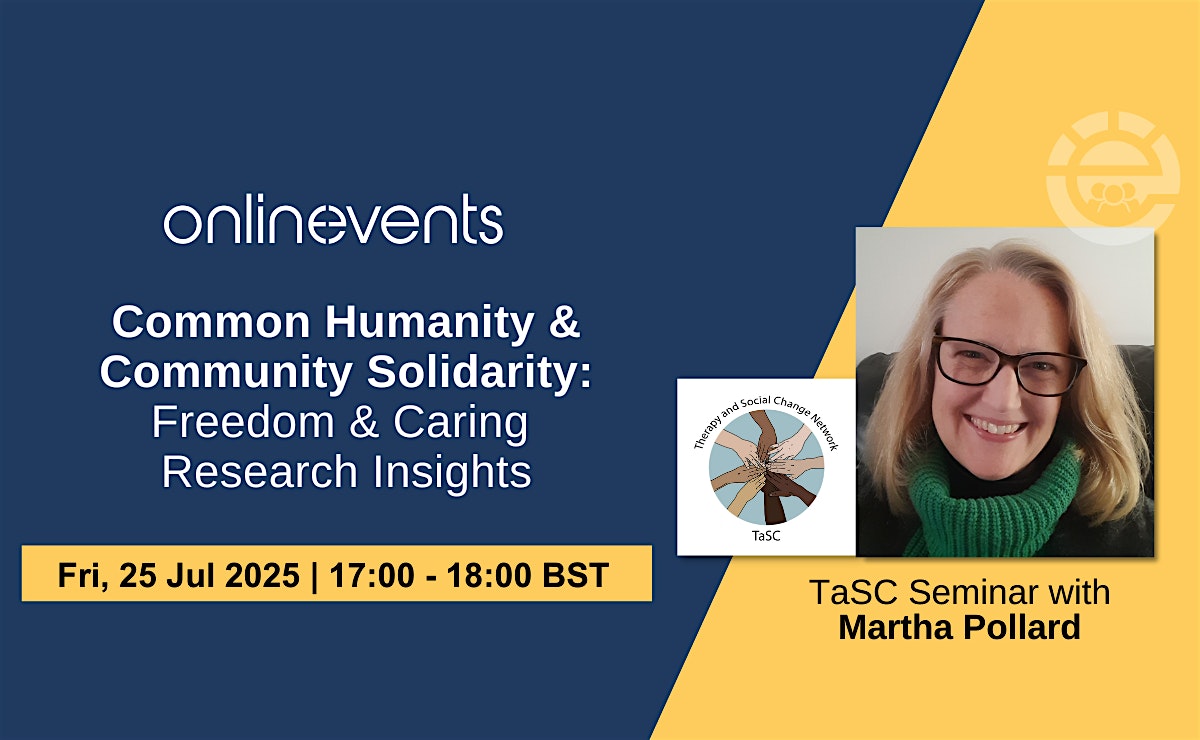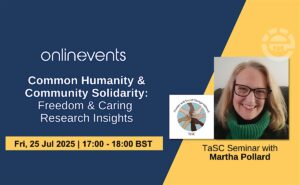About this event
This workshop will outline and discuss findings from a qualitative study of family and staff carer perspectives on meanings of freedom and caring. When carers talked about what freedom means to them, they gave multiple examples from the contexts of their caring experiences. Although each person’s circumstances were unique to them, two underlying features connecting all experiences of freedom were (1) common humanity and (2) community solidarity.
The study’s findings show the need for values-led, hyper-local spaces for listening, resting, learning and connecting that can also provide flexibility of sustained accompaniment and practical support over time. Discussion will focus on how listeners/therapists, support workers, faith/spiritual communities, social activists, creatives and many more, may already embody common humanity and support community solidarity, and we will explore how cross-connections that can strengthen these vital values might be cultivated even more widely.
Learning Objective Participants Can Expect From This Event
- Participants will be able to critically examine the relevance of this qualitative study of freedom and caring in relation to their own and others’ life and work contexts.
- Participants will be able to explore the impact of differing interactional experiences of common humanity or community solidarity within their own and others’ life and work contexts.
- Participants will be able to co-reflect on what is already under way and/or what steps they might consider taking to encourage cross-connections that support different aspects of common humanity and community solidarity.
Who is This Workshop Appropriate For?
- Counsellors, psychotherapists, mindfulness practitioners/teachers, health & social care staff, community organisations/projects, faith/spiritual communities, chaplains, social/dementia activists, dementia support workers, dementia care researchers, health & social care staff, community health projects, faith/spiritual communities.
This Workshop May Impact Participants’ Practice by
- Enabling space for clarifying perspectives and personal vision.
- Making cross-connections between individual therapeutic approaches and community therapeutic approaches.
- Enhancing sense of purpose through values-connecting collaborations that cultivate common humanity and community solidarity for the benefit of all.
ZOOM
This event will be hosted on the Zoom meeting platform where we will use our cameras and microphones to interact with each other as a group.
___________________________
At Onlinevents, we and the presenters we collaborate with are committed to working in a way that aligns with the ethical codes and frameworks of our respective professional organisations. We expect all colleagues attending our events to uphold the ethical principles of their professional membership.
If you are not a member of a professional organisation, we ask that you participate in a way that is both authentic and respectful, fostering a space of mutual learning and professional engagement.
By registering for this event, you agree to be present and interact in a manner that reflects these principles.
Martha Pollard

Martha Pollard is a Scottish Borders-based person-centred counsellor, trainer and mindfulness teacher. Her doctoral research at the University of Edinburgh explores freedom and caring experiences from human rights and liberation theology perspectives. She is a current trustee on the Board of COSCA representing the Research Area of Interest.
Website | www.dementiaresearcher.nihr.ac.uk



